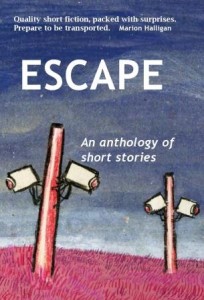 1. Who are the short fiction authors you admire (Australian or otherwise, alive or dead)?
1. Who are the short fiction authors you admire (Australian or otherwise, alive or dead)?
I’ll confess straight up and say that I actually don’t read a huge amount of short stories. Most of the short fiction I’ve read is from high school. I like Cilla McQueen, Apirana Taylor, Katherine Mansfield… Hm, my English teachers will probably notice a trend – they’re authors of the short stories we’ve been studying!
I also admire some writers who aren’t published yet. Peers at school, people on the Internet, sometimes their stories are so charged with emotion, or so authentic, or they present the story in such a creative way. These people I admire, and are wary of – they’re the next generation of short fiction authors, but they’re also my competitors.
2. What is the most memorable short story you have read? And why does it stand out for you?
I am so bad at answering these types of questions, maybe because I never have a ‘most’ memorable/favourite story. They’re all so good in different ways! The title that comes to focus out of the dozens brimming in my mind is The Lottery. Like many good short stories out there, I like how the author blatantly laid out the story, not distorting the camera lenses for the reader, not even till the last moment. I love how we go in without prejudice and the author trusts that we’re intelligent enough to make up our own conclusions.
3. What do you like about the short story form?
I like reading good short stories because I find it interesting how exhaustive it is, just how intensely the writer is making the reader work. It’s almost like doing interval training in sports: I can’t read too many short stories at one time – I get burnt out! Now from the writing perspective…I used to favour the novel form more than short story but now I’m a uni student, that’s changed. An average day for me now is pretty packed. After taking out a must-have 6~8 hours of sleep, I’m left with being a full time medical student’s lectures and study and all. Plus 1~3 hours of sport. A-and, since I still want to steal time to gull my writer-self that I still care about her, short stories and poems become simply more practical. Writing short stories is also great practice. Sometimes I tell myself, okay, in this 3000 words focus on character, or a kind of style, or an emotion. Like doing drills, it helps fine-tone skills and really concentrate on the tooth-floss thin line of control over each element that makes up a good story.
4. How would you describe your own writing?
Well, since I’ve only just started writing seriously last year (as in entering competitions), my writing style still very naïve and evolving. I’d like to think that my writing style changes to suit the theme or the writing form I’m interacting with. But to describe my writing in general…I try to take something from everyday life, something mundane, and show how special it. I’d hope that my writing is simple by nature, but talking about complex issues. You’ll have to tell me if that’s a valid description or not.
5. Which of your stories are you most fond of right at this moment and why?
Oh, this is a hard question – I actually had to go to my folder of short stories and look through it to jog my memory. I think I’m particularly fond of Home just coz it’s won me some cash and that it’s going to be published. Home is also the short story that actually made me ‘click’ with the short story form. Um, after looking through my folder again, and, as bad as it sounds, there isn’t actually another ‘story’ that I’m fond of at the moment. There is, however, a poem that kind of brings a wry smile to my face when I think of it. It was the first (and I have a sinking suspicious feeling, also the last) poem that I will/have written this semester. I remember feeling fed up with not having enough time writing stories and wanting to write a poem because I ‘thought’ it would take less time instead. In the end it took me an hour to squeeze out the 363 words (so much for less time) and I can still recall myself being ridiculously drained but just so pleased.
6. Where do the ideas for your stories come from? (Take us through an example)
Ideas. Anything and everything I suppose. Maybe a word, an action, or an event that provoked a reaction out of me – writing’s all about making the reader feel so if it made the writer feel, it must be worth it. Maybe a snippet of conversation that I overheard in the library. Or maybe I’ll steal a sentence from a favourite book.
I’ll take No More Nagging for my example. There was a girl two years below me in my high school that passed away very suddenly. In my school, everyone knew of everyone and so we were all affected. I felt compelled to do something. I only knew her by face and to put it simply, I didn’t think I would do justice if I wrote of her. But I knew I could simulate an event as close as what had happened. I knew of the girl through mutual friends – the reader hears of the character through the narrative; I saw the girl around campus – the reader sees the character in the narrative’s mind. As the story progresses, the reader becomes attached to this character even though they have never met her first hand…now, that’s enough of that story otherwise I’m going to spoil it for people.
7. What is your writing process – from idea to publication? (Do you go it alone or are others involved?)
Like I said, I’m really busy so whereas I used to be able to just sit down and pour everything out in one go, then leave it for a few days and edit and edit and edit. Now after inspiration strikes, the first draft is written over a longer time period. The bones are frantically typed out before lectures when waiting for the lecturer to come in, or when waiting for friends to arrive at dinner. That creates a very rough idea of the story. Then again, I try to grab snippets of time to flesh the story out till there’s an extremely rough first draft. I have to determine at this stage whether or not to continue filling out the story five sentences by five sentences or actually allocate a time to sit down and pound away at the keyboard without mercy. So this is when I shoot it over to my awesome editor/friend Sophie Constable to see if she gives me the green light. If boss gives the all clear, I start on the details. The story will go through quite a few drafts, and be sent back and forth between us two and critiqued over and over again. When it seems presentable, it’ll be promoted from ghosting around on my desktop to a position in the short story folder. And it’ll live there till a suitable competition catches my eye, and then probably undergo more surgery. Ahem, I meant, changes.
8. Do you feel the short story form is valued in Australia? What makes you say this?
I get this feeling that the short story form is valued more by writers than by readers. People seem to know a lot more novels than short stories. I suppose for writers, the short story form provides a platform for writers to present their skills and also to enter (lots of) competitions.
9. How do you feel about your work being published in non-print forms such as digital and audio?
I don’t think it’s much of a problem. It’s a great way to gain access to a greater audience and it’s impossible to resist change that’s washing over us like a tsunami tide. Personally, the traditional paper is still my highest goal and my most prized way of publication but I still see the different medium meaning reaching a different target audience. For example, audio and digital are often free so that would reach a wider range of people who read more for fun; hardcopy would reach readers who are more demanding because they’ve spent money to buy the piece and expect a degree of quality in the literature. There are pros and cons for each medium.
10. What advice would you like to offer Spineless Wonders?
Great job in promoting the art of the short story, and thank you for creating opportunities for budding writers like myself to have a chance in the big wide world of publishing.
Yin Lin has being shortlisted by the Sunday Star Times awards, awarded a mentorship from the NZ Society of Authors, and been commended in the NZ Poetry Society’s International Poetry Competition before moving to Australia. She’s been published online for the Auslit Review competition, and in the hard copy anthologies Across the Fingerboards , The World’s Steepest Street, Escape and The Temptation of Sunlight. She is now studying medicine and is self-diagnosed with literature deficiency.
